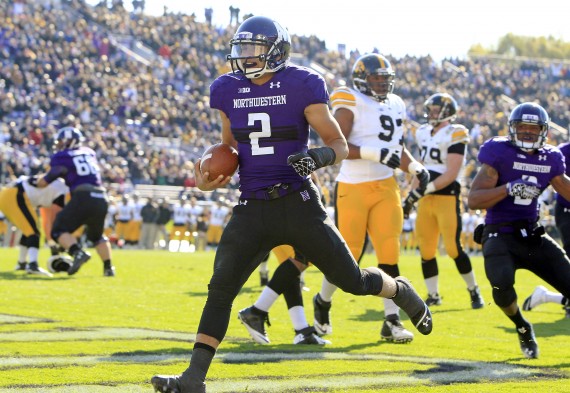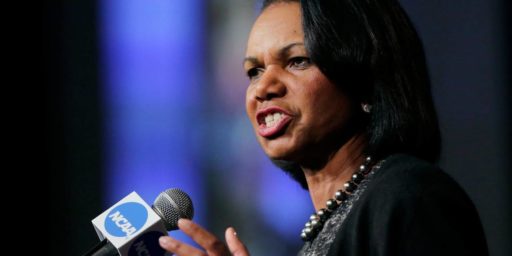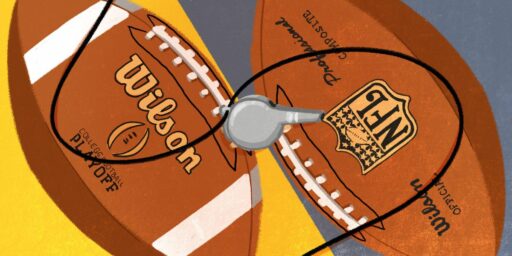N.L.R.B. Denies Student Athletes’ Bid To Unionize
The National Labor Relations Board refused to certify an effort by athletes at Northwestern University to unionize.
The National Labor Relations Board has overturned the ruling of a lower-level official who had accepted the effort of student athletes at Northwestern University to unionize:
The National Labor Relations Board on Monday dismissed a petition by Northwestern football players who were seeking to unionize, effectively denying their claim that they were university employees. In a unanimous decision that was a clear victory for the college sports establishment, the five-member Board declined to exert its jurisdiction in the case and preserved, for now, one of the N.C.A.A.’s core principles: that college athletes are primarily students.
The board did not rule directly on the central question in the case — whether the players are university employees — but the decision is a major setback to the union movement in college sports, which was led by the former Northwestern quarterback Kain Colter and backed by the College Athletes Players Association, a United Steelworkers-supported group that sought to represent the players.
In a conference call with reporters Monday, N.L.R.B. officials explained that the novelty of the case — no other single team in a sports league had come before the Board seeking to unionize — was a factor in its decision that would have wide-ranging consequences for college sports. The board decided that allowing one team to collectively bargain would not promote stability in the labor market and could upset competitive balance in college sports. It could also potentially conflict with the rules set by Northwestern’s conference, the Big Ten, and the N.C.A.A.
The N.L.R.B., which has jurisdiction only over the private sector, was also reluctant to wade into territory that would have affected public universities. The vast majority of top-level college football programs are from public colleges, and Northwestern is the only private institution in the Big Ten. The College Athletes Players Association cannot appeal Monday’s decision, an N.L.R.B. official said.
As I said at the time that the original decision was handed down, the idea of student athletes unionizing in the same sense that employees in private industry do is really quite ridiculous when you examine the issue in anything other than a cursory manner. While it’s true that these athletes generate a lot of money for the schools they play for, especially at the elite level, at the end of the day they are students, not employees. The fact that they are governed by rules imposed by the NCAA and by their own schools regarding their ability to make money in connection with their athletic career while in college does not obviate the fact that they are, in the end, students. Other than their scholarships, they don’t receive any extra compensation for their time as an athlete, and in many cases the entire reason they are playing is for a chance to move to the NBA, NLF, or Major League Baseball where they will actually make money from their athletic abilities. That group, however, is a relatively small portion of the people that fall under the definition of “student athlete,” though, and to argue that all of them fall within the definition of an employee under the labor laws makes no sense whatsoever.
As far as this particular case in concerned, this is the end of the road. Because of the way the case was brought before the NLRB, the students at Northwestern do not have any further right to appeal the Board’s ruling on the certification issue. That being said, it’s likely that this type of issue will present itself again in the future. Between the amount of money that college sports generates for universities, broadcasters, and sponsors, and the ongoing issues created by things such as the concussion problem in football, it’s likely that future student athletes will demand some form of protection for their interests, or say in how the sport is governed. Rather than going the unionization route, though, it strikes me that the best solution to this problem could be found at the university level, at the conference level, or in the NCAA itself. These institution have a much longer history of dealing with all the issues that student athletics deal with. Bringing the courts and the Federal bureaucracy into the situation doesn’t seem like it will accomplish anything.
Here’s the decision:







N.L.R.B. officials explained that the novelty of the case…
and
The N.L.R.B., which has jurisdiction only over the private sector, was also reluctant….
Sounds to me like they were scared.
Why not Doug? Stop making assertions and make an actual argument backed up by facts within a frame of logic. Why is a scholarship (for the very few who get them) NOT part of a compensation package (employment) and why are the college athletes who get nothing (the vast majority) not due something when their universities (most universities do not) make millions?
Really Doug? Really? I know you were born at night but was it last night? NONE of those organizations, not the Universities, the Conferences, or the NCAA exist for the benefit of the student athlete, rather the current system was set up for the express purpose of exploiting the student athlete.
Might as well have told the slaves to appeal to the Christian nature of their benevolent owners to stop beating them when they don’t pick their quota of cotton.
By your logic Doug, anyone who works a sports game shouldn’t be paid because they receive the “benefit” of watching the game.
“Student athlete” is a made up term, and a pernicious myth. Considering that these students are not only risking their health, but their lives, for our amusement, saying “free room and board and bullshit classes no one cares about” is just compensation is laughable.
If a student on academic scholarship works extra hours at a stadium, or in the library, or as an RA, do we harp on about how just merely attending the university is “just compensation?” What about graduate students? They should be happy just to be in the program! Let’s pay them nothing and see what happens, because they “might” get into the NFL of academics, which is tenure track.
Then again, most of these “student athletes” are black, so who cares what happens to them, there’s plenty more in the ghetto to exploit.
These kids are not asking for a lot. Maybe a stipend of 10k a year or something. SOMETHING. But no, old fat white men who know other old fat white men and talk a lot about making money because they’re old fat white men need to have their Bowl sinecures and administrative salaries. Those hors d’oeurves at those fundraisers won’t eat themselves, and why let that open bar go to waste…?
@OzarkHillbilly: The line that gobsmacked me was
Wait a second, I thought this decision was about the players being students not employees; now it’s about “promoting stability in the labor market?”
It seems to me that the NLRB needs to pick one; both can’t be true at the same time.
(A side note: what makes the NLRB believe that individual student athletes don’t bargain their deals with the schools that
hireselect them for scholarships? Or doesn’t that bargaining “affect competitive balance?”)Since when is competitive balance in college sports the purview of the NLRB?
I think every college athlete should have his or her scholarship rescinded and they should form their own minor leagues to audition for the pros. Build their own stadiums, hire all the staffs, refs etc. Buy the equipment. Maintenance, workout facilities. Basically everything. Then they can whack up the residual profits.
It would be millions, you know……..
@Lit3Bolt: Ya know, I see your point about the stipend, but it isn’t really as easy as it looks. Think about it, if, say Ohio State, started paying the players a 10k per year stipend, where would OSU get the $4 million/year to pay Urban Meyer. You can’t have everything, doncha know.
The vast majority of athletic money comes from football and basketball but the vast majority of college athletes are neither. Unionizing would essentially mean the death of every male sports program other than those two sports with baseball thrown in at a few schools. Women’s sports would also take a hit but title IX would save some of their programs.
I don’t see the need to unionize.
However I do see the need for some protection through the NCAA for injured athletes (I think if a student is injured while playing their college dreams shouldn’t end with the injury) and I think relaxing some rules with regards to student athletes making money from endorsements.
Since college football and basketball are basically development leagues for pro sports teams the should required to pay the “student athletes.”
@OzarkHillbilly:
+10000000
you could post this comment after every one of Doug’s posts
Really? Let’s apply a few tests…
1. These students are admitted to the university on the basis of their academic credentials, not their athletic credentials?
2. The scholarships awarded to these students are merit scholarships for academic prowess?
3. These students would be just as welcome to enroll if they chose not to participate in amateur athletics?
4. These students would retain their academic standing if cut from the athletic squad?
5. These students are encouraged to place academic requirements ahead of the desires of the athletic department?
If you answered “TRUE” to any of the above, you know nothing about major college athletics. So what exactly is it that makes these kids primarily students, and not paid athletes? The fact that it would be really really convenient to a lot of university trustees if you think that?
http://www.sbnation.com/college-football/2014/4/10/5594348/college-football-bag-man-interview
This is the arrangement in high-stakes college football, though of course not every player is paid for. Providing cash and benefits to players is not a scandal or a scheme, merely a function. And when you start listening to the stories, you understand the function can never be stopped.
“Last week I got a call. We’ve got this JUCO transfer that had just got here. And he’s country poor. The [graduate assistant] calls me and tells me he’s watching the AFC Championship Game alone in the lobby of the Union because he doesn’t have a TV. Says he never owned one. Now, you can buy a Walmart TV for $50. What kid in college doesn’t have a TV? So I don’t give him any money. I just go dig out in my garage and find one of those old Vizios from five years back and leave it for him at the desk. I don’t view what I do as a crime, and I don’t give a shit if someone else does, honestly.”
“If we could take a vote for these kids to make a real salary every season, I would vote for it. $40,000 or something. Goes back to mama, buys them a car, lets them go live like normal people after they work their asses off for us. But let’s be honest, that ain’t gonna stop all this. If everyone gets $40,000, someone would still be trying to give ’em 40 extra on the side.”